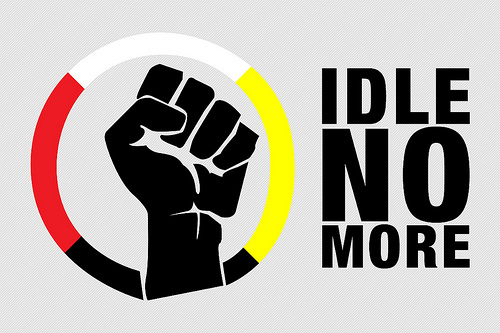By Nadine Moedt (The Cascade) – Email
Print Edition: January 9, 2013
Its Facebook page has nearly 55,000 “likes.” Not bad for a grassroots movement that began less than two months ago. But the Idle No More movement has been criticized throughout as being vague, with broad and unclear goals.
In their mission statement, the group “calls on all people to join in a revolution which honours and fulfills Indigenous sovereignty which protects the land and water.”
That seems pretty clear to me.
The movement began in response to Bill C-45, an omnibus bill that has now been christened the “Jobs and Growth Act.” Don’t be fooled by the name; the bill is huge and scary, spanning some 400 pages of legislation, and changing 64 acts and regulations. Idle No More is concerned with three of the major changes contained in the act.
First, the Indian Act has been changed to allow an “easier opening of treaty lands and territory,” according to the Idle No More website. First Nations communities may lease reserve land if a majority votes to do so at any meeting called with the purpose of having such a vote. This change allows for an easier opening for developers and industry in reserve land; previously, the approval of the majority of all eligible voters was required.
The Navigation Protection Act was also dramatically altered. Major pipeline and power line projects are no longer required to even attempt to protect navigable waterways they may cross, unless they appear on the Transportation Minister’s list. According to the CBC, Idle No More states that this alteration removes the protection of almost every lake and river in Canada. Only 62 rivers and 97 lakes are now specifically listed as being protected, a mere fraction of what was protected before the change.
The last major objection Idle No More has with this bill is related to the Environmental Assessment Act. This act promotes the first omnibus budget bill’s goal of eliminating the requirement for many projects to complete an environmental assessment and thus affords the projects a faster approval process.
Other concerns about the living conditions of many First Nations bands, suicide rates among the youth, and overrepresentation of First Nations in prisons have been voiced.
The object of the movement is expressed very eloquently in the mission statement:
Canada has become one of the wealthiest countries in the world by using the land and resources. Canadian mining, logging, oil and fishing companies are the most powerful in the world due to land and resources. Some of the poorest First Nations communities (such as Attawapiskat) have mines or other developments on their land but do not get a share of the profit. The taking of resources has left many lands and waters poisoned – the animals and plants are dying in many areas in Canada. We cannot live without the land and water. We have laws older than this colonial government about how to live with the land.
The First Nations of Canada have had it with Harper. Their goal–a simple movement to gain respect they deserve–is unmistakable. Their means of achieving it, however, is flawed. This has been most clearly demonstrated by a prolonged and painful hunger strike on the part of Theresa Spence, Chief of the struggling First Nations community Attawapiskat.
Spence announced that she would begin a hunger strike, surviving on a liquid diet until the Prime Minister agrees to meet with her. Spence has been living in an encampment on Victoria Island in Ottawa ever since.Stephen Harper has only recently announced that he would see her, setting a meeting date for January 11 after nearly a month of her hunger strike.
Harper’s willingness to ignore Spence, who is practically banging on his front door, really says it all. According to The Ottawa Citizen, First Nations peoples make up just four per cent of the voting population. With voter turnout “notoriously low,” why should Harper give a damn? Why should anyone in the Government?
Only when the First Nations peoples convince a mass audience of their right to exist with dignity, of their right to protect their traditional lands, and of their worth as a culture can they succeed in convincing the Harper government the same. The movement must gain this mass support, or else resign itself to being the bark that’s worse than its bite. The movement’s objective must remain transparent, and its protests must remain peaceful and diplomatic. Spence’s hunger strike ends this week. Its main victory was not its ability to draw in Harper for a meeting, but rather to gain the attention of an audience that will continue to grow and at last have some sway with the Harper government.
Adam Goldenberg, in The Ottawa Citizen, writes that there is “more at stake in Idle No More than the protest’s own success.
“A bona fide movement for reconciliation between aboriginal peoples and the Crown should be a meaningful opportunity to teach Canadians that aboriginal rights are constitutionally guaranteed,” Goldenberg writes. “Canada’s success as a multinational society depends on our ability to reckon with the difference and injustice that have always defined us.”


